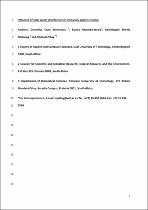JavaScript is disabled for your browser. Some features of this site may not work without it.
- ResearchSpace
- →
- Research Publications/Outputs
- →
- Journal Articles
- →
- View Item
| dc.contributor.author |
Ssemakalu, CC

|
|
| dc.contributor.author |
Pillay, M

|
|
| dc.contributor.author |
Ubomba-Jaswa, Eunice

|
|
| dc.contributor.author |
Motaung, KS

|
|
| dc.date.accessioned | 2015-10-15T08:01:41Z | |
| dc.date.available | 2015-10-15T08:01:41Z | |
| dc.date.issued | 2014-09 | |
| dc.identifier.citation | Ssemakalu, CC, Pillay, M, Ubomba-Jaswa, E and Motaung, KS. 2014. Influence of solar water disinfection on immunity against cholera: a review. Journal of Water and Health, Vol 12(3), pp 393-398 | en_US |
| dc.identifier.issn | 1477-8920 | |
| dc.identifier.uri | http://www.ncbi.nlm.nih.gov/pubmed/25252341 | |
| dc.identifier.uri | http://hdl.handle.net/10204/8183 | |
| dc.description | Copyright: 2014 IWA Publishing. Due to copyright restrictions, the attached PDF file only contains the abstract of the full text item. For access to the full text item, please consult the publisher's website. The definitive version of the work is published in the Journal of Water and Health, Vol 12(3), pp 393-398 | en_US |
| dc.description.abstract | Cholera remains a problem in developing countries. This is attributed to the unavailability of proper water treatment, sanitary infrastructure and poor hygiene. As a consequence, countries facing cholera outbreaks rely on interventions such as the use of oral rehydration therapy and antibiotics to save lives. In addition to vaccination, the provision of chlorine tablets and hygiene sensitization drives have been used to prevent new cholera infections. The implementation of these interventions remains a challenge due to constraints associated with the cost, ease of use and technical know how. These challenges have been reduced through the use of solar water disinfection (SODIS). The success of SODIS in mitigating the risk associated with the consumption of waterborne pathogens has been associated with solar irradiation. This has prompted a lot of focus on the solar component for enhanced disinfection. However, the role played by the host immune system following the consumption of solar-irradiated water pathogens has not received any significant attention. The mode of inactivation resulting from the exposure of microbiologically contaminated water results in immunologically important microbial states as well as components. In this review, the possible influence that solar water disinfection may have on the immunity against cholera is discussed. | en_US |
| dc.language.iso | en | en_US |
| dc.publisher | IWA Publishing | en_US |
| dc.relation.ispartofseries | Workflow;14743 | |
| dc.subject | Cholera | en_US |
| dc.subject | Solar water disinfection | en_US |
| dc.subject | SODIS | en_US |
| dc.subject | Solar ultraviolet radiation | en_US |
| dc.subject | V. cholerae | en_US |
| dc.subject | Waterborne diseases | en_US |
| dc.subject | Vaccines | en_US |
| dc.title | Influence of solar water disinfection on immunity against cholera: a review | en_US |
| dc.type | Article | en_US |
| dc.identifier.apacitation | Ssemakalu, C., Pillay, M., Ubomba-Jaswa, E., & Motaung, K. (2014). Influence of solar water disinfection on immunity against cholera: a review. http://hdl.handle.net/10204/8183 | en_ZA |
| dc.identifier.chicagocitation | Ssemakalu, CC, M Pillay, Eunice Ubomba-Jaswa, and KS Motaung "Influence of solar water disinfection on immunity against cholera: a review." (2014) http://hdl.handle.net/10204/8183 | en_ZA |
| dc.identifier.vancouvercitation | Ssemakalu C, Pillay M, Ubomba-Jaswa E, Motaung K. Influence of solar water disinfection on immunity against cholera: a review. 2014; http://hdl.handle.net/10204/8183. | en_ZA |
| dc.identifier.ris | TY - Article AU - Ssemakalu, CC AU - Pillay, M AU - Ubomba-Jaswa, Eunice AU - Motaung, KS AB - Cholera remains a problem in developing countries. This is attributed to the unavailability of proper water treatment, sanitary infrastructure and poor hygiene. As a consequence, countries facing cholera outbreaks rely on interventions such as the use of oral rehydration therapy and antibiotics to save lives. In addition to vaccination, the provision of chlorine tablets and hygiene sensitization drives have been used to prevent new cholera infections. The implementation of these interventions remains a challenge due to constraints associated with the cost, ease of use and technical know how. These challenges have been reduced through the use of solar water disinfection (SODIS). The success of SODIS in mitigating the risk associated with the consumption of waterborne pathogens has been associated with solar irradiation. This has prompted a lot of focus on the solar component for enhanced disinfection. However, the role played by the host immune system following the consumption of solar-irradiated water pathogens has not received any significant attention. The mode of inactivation resulting from the exposure of microbiologically contaminated water results in immunologically important microbial states as well as components. In this review, the possible influence that solar water disinfection may have on the immunity against cholera is discussed. DA - 2014-09 DB - ResearchSpace DP - CSIR KW - Cholera KW - Solar water disinfection KW - SODIS KW - Solar ultraviolet radiation KW - V. cholerae KW - Waterborne diseases KW - Vaccines LK - https://researchspace.csir.co.za PY - 2014 SM - 1477-8920 T1 - Influence of solar water disinfection on immunity against cholera: a review TI - Influence of solar water disinfection on immunity against cholera: a review UR - http://hdl.handle.net/10204/8183 ER - | en_ZA |






